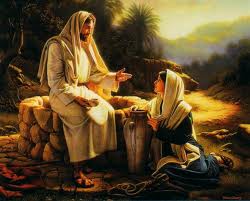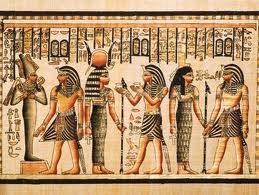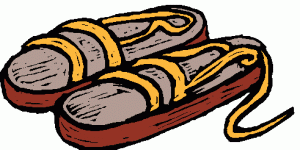From the Category, “The Eastern Eye”
[The Bible is an “Eastern” book. It was written many years ago in the “East” which today we refer to as “The Middle East.” As such, there are many customs and idioms that are not familiar to the “Western” mind.
In understanding the Scriptures it is important for us to understand the culture, but it doesn’t mean that we should necessarily follow that culture. Rather, it is in the understanding of the Eastern culture that we gain light and understanding about many things in the Bible.]
(At the end of this post there is a beautiful song by Lisa Tracy, called, “Simeon and Anna.)
There is an event recorded in the second chapter of the Gospel of Luke that happened soon after Jesus was born that many overlook and most never talk about. However, this event carries great significance as well as a tremendous lesson in God’s faithfulness. It’s the record of Simeon and Anna.
Background
A brief look at the Old Testament Law requirements helps us better appreciate the event in the temple 41 days after Jesus’ birth. Firstly, Jesus was, according to the Law, circumcised 8 days after his birth. It was at his circumcision that he was named Jesus.
There were two other laws that Joseph and Mary obeyed. They brought Jesus to the Temple to present him before the Lord. They also offered a sacrifice.
After childbirth, the mother was considered ceremonially unclean for a period of time. That means she would not be allowed to be involved with anything considered sacred, including entering into the Temple. So, when her time was right, Joseph and Mary traveled the six miles from Bethlehem to the Temple in Jerusalem for two ceremonies: Mary’s purification and the presentation of her firstborn.
According to the Old Testament, the firstborn belongs to God. Scholars tell us the presentation ceremony included a formal presentation of the child to the priest. Token redemption money of five shekels was then paid.
Purification
The details concerning the purification are recorded in Leviticus 12:1-8, which you can read at the end of this post.
When the days of her purification for a son or daughter are over, the mother is to bring the child and a lamb of the first year for a burnt offering, and a young pigeon, or a turtledove, for a sin offering to the priest. Thus, two offerings were required.
The Law also stipulated that, “if she be not able to bring a lamb, then she shall bring two turtles, or two young pigeons; the one for the burnt offering, and the other for a sin offering: and the priest shall make an atonement for her, and she shall be clean.”
As noted in Luke, Chapter 2, Joseph and Mary did not bring a lamb of the first year, but instead brought a pair of turtledoves, or two young pigeons. Some have suggested they did this because they were so poor. God Almighty, the God of abundance and prosperity didn’t have His only begotten Son grow up in poverty; there is a deeper reason.
This child, Jesus, was no ordinary child; he would one day sacrifice his life for the sins of the whole world. John the Baptist referred to him as “The lamb of God who takes away the sin of the world.” For this reason, Joseph and Mary opted for the turtledoves or pigeons for their sacrifice.
Simeon
While Joseph and Mary were performing these two laws, a man by the name of Simeon came into the Temple. The Bible tells us that he was just and devout, and, waiting for the consolation of Israel. We also learn that the holy spirit was upon him, meaning that he had the spirit from God.
God had revealed to this man that he would not die before he had seen the Lord’s Christ. What a fantastic promise! People had been waiting and expecting the Christ for hundreds and hundreds of years, and God promised Simeon that he would see him before he died.
The Bible says that he “came by the spirit into the Temple,” which means God revealed to him that he should go into the Temple. He did, and then he took up Jesus in his arms and praised God. What a fantastic moment in his life that must have been.
Anna
And then, an elderly woman named Anna came in right at that moment. The Bible tells us that she was a prophetess, which means she also had the spirit of God. From the context we can certainly conclude that God sent her in at that moment as well.
The Bible gives us much more information about Anna than Simeon. In the culture of the lands and times of the Bible, women did not have as much credibility as men. There were certain things that women were not permitted to do.
For most of us reading this record today, the extra details about Anna may not be as important as they were to readers of the Gospels in the first century. So, God lovingly added a number of details to show what a wonderful woman Anna was.
The prophetic words that both Simeon and Anna spoke are full of great truths. We’ll save that discussion for another time. But consider how those words must have inspired and encouraged Joseph and Mary, who had the responsibility of raising this child.
Great Significance
One of the things that is so significant about the event of Simeon and Anna is the mention of God’s spirit, upon both Simeon and Anna. It was the spirit of God directing two people, who had God’s spirit, to go and see the Christ.
It is significant because part of Christ’s work was to restore and make available the spirit of God to all of mankind. Jesus spoke of the spirit, or comforter, to come on a number of occasions. On the day of Pentecost, Christ’s work having been accomplished, Peter encouraged those listening to him to receive the gift of the holy spirit.
A Great Lesson
A great lesson one can take from this event is the faithfulness of God Almighty. First, God promised, in the Scriptures, to send a savior, a redeemer. He kept His word and sent His only begotten Son, Jesus Christ.
Secondly, God made a special promise to Simeon. He promised him that he would not see death before he had seen the Christ. Again, God kept His word; Simeon saw the Christ.
There are things that God has said in the Scriptures that will take place in the future. Because He is faithful and does not lie, they will absolutely happen. He has promised to send His Son back to gather us together, and it will happen.
There are also promises in the Bible to you and to me. We receive those promises into our lives when we accept them as true and believe God. When we do, we will absolutely receive what He has promised.
And there are times when God will specifically reveal something just for you. You can choose to believe what He tells you. Doing so, just like Simeon, you will receive what God has spoken to you.
God Almighty is faithful to His Word, whether written or spoken. He says what He means and He means what He says. He is absolutely, completely trustworthy.
Here is a song by Lisa Tracy, called, “Simeon and Anna.”
http://confidenceandjoy.com/wp-content/audio/Podcast/Simeon
Luke 2:21-38
And when eight days were accomplished for the circumcising of the child, his name was called Jesus, which was so named of the angel before he was conceived in the womb.
And when the days of her purification according to the law of Moses were accomplished, they brought him to Jerusalem, to present him to the Lord;
(As it is written in the law of the Lord, Every male that openeth the womb shall be called holy to the Lord;)
And to offer a sacrifice according to that which is said in the law of the Lord, A pair of turtledoves, or two young pigeons.
And, behold, there was a man in Jerusalem, whose name was Simeon; and the same man was just and devout, waiting for the consolation of Israel: and the Holy Ghost was upon him.
And it was revealed unto him by the Holy Ghost, that he should not see death, before he had seen the Lord’s Christ.
And he came by the Spirit into the temple: and when the parents brought in the child Jesus, to do for him after the custom of the law,
Then took he him up in his arms, and blessed God, and said,
Lord, now lettest thou thy servant depart in peace, according to thy word:
For mine eyes have seen thy salvation,
Which thou hast prepared before the face of all people;
A light to lighten the Gentiles, and the glory of thy people Israel.
And Joseph and his mother marvelled at those things which were spoken of him.
And Simeon blessed them, and said unto Mary his mother, Behold, this child is set for the fall and rising again of many in Israel; and for a sign which shall be spoken against;
(Yea, a sword shall pierce through thy own soul also,) that the thoughts of many hearts may be revealed.
And there was one Anna, a prophetess, the daughter of Phanuel, of the tribe of Aser: she was of a great age, and had lived with an husband seven years from her virginity;
And she was a widow of about fourscore and four years, which departed not from the temple, but served God with fastings and prayers night and day.
And she coming in that instant gave thanks likewise unto the Lord, and spake of him to all them that looked for redemption in Jerusalem.
Leviticus 12:1-8
And the Lord spake unto Moses, saying,
Speak unto the children of Israel, saying, If a woman have conceived seed, and born a man child: then she shall be unclean seven days; according to the days of the separation for her infirmity shall she be unclean.
And in the eighth day the flesh of his foreskin shall be circumcised.
And she shall then continue in the blood of her purifying three and thirty days; she shall touch no hallowed thing, nor come into the sanctuary, until the days of her purifying be fulfilled.
But if she bear a maid child, then she shall be unclean two weeks, as in her separation: and she shall continue in the blood of her purifying threescore and six days.
And when the days of her purifying are fulfilled, for a son, or for a daughter, she shall bring a lamb of the first year for a burnt offering, and a young pigeon, or a turtledove, for a sin offering, unto the door of the tabernacle of the congregation, unto the priest:
Who shall offer it before the Lord, and make an atonement for her; and she shall be cleansed from the issue of her blood. This is the law for her that hath born a male or a female.
And if she be not able to bring a lamb, then she shall bring two turtles, or two young pigeons; the one for the burnt offering, and the other for a sin offering: and the priest shall make an atonement for her, and she shall be clean.
John 1:36
And looking upon Jesus as he walked, he saith, Behold the Lamb of God!
John 15:26
But when the Comforter is come, whom I will send unto you from the Father, [even] the Spirit of truth, which proceedeth from the Father, he shall testify of me:
Acts 2:38
Then Peter said unto them, Repent, and be baptized every one of you in the name of Jesus Christ for the remission of sins, and ye shall receive the gift of the Holy Ghost.
Mike Verdicchio
2012
Leave A Comment!
Do you have some thoughts about this? We’d love to hear what you think. To leave a comment if you are receiving this post via email or RSS, just click the title above and scroll to the bottom of the post and type in your comment. If not, just scroll to the bottom of this post and type in your comment.
Share This Article!
To share this article on social media, like Facebook, or, Twitter, there are links below.
Resources
There are a number of books that you can read to get insight on customs, manners, idioms and meanings from the Eastern culture in which the Bible was written. The best I know of were written by Bishop K. C. Pillai. I have had the pleasure of listening to many recorded teaching by him.
He wrote three books, and they are hard to find, and are usually over priced. But, if you want to you can check this link to see what Amazon has to offer. Light Through an Eastern Window
Another great resource that I have used for years is a book called, “Manners and Customs of the Bible,” by James Freeman. Mine was printed in 1972 and I know they have newer additions. For the newest edition, just click the link and it will take you to Amazon. The New Manners and Customs of the Bible (Pure Gold Classics)
More Eastern Eye Articles





